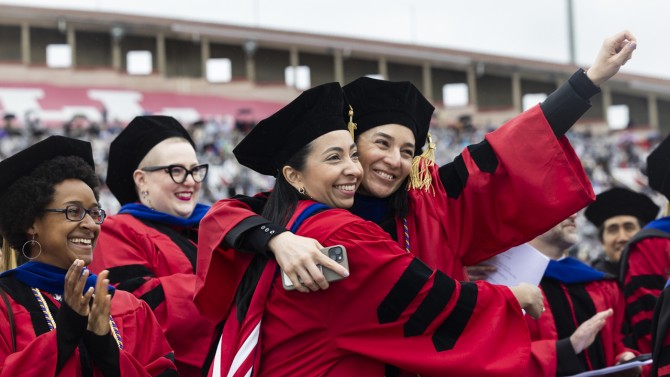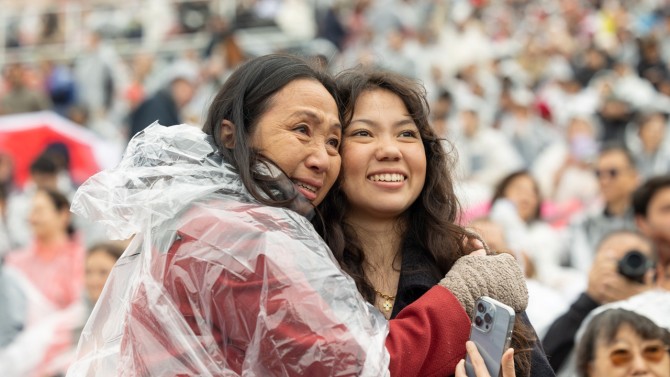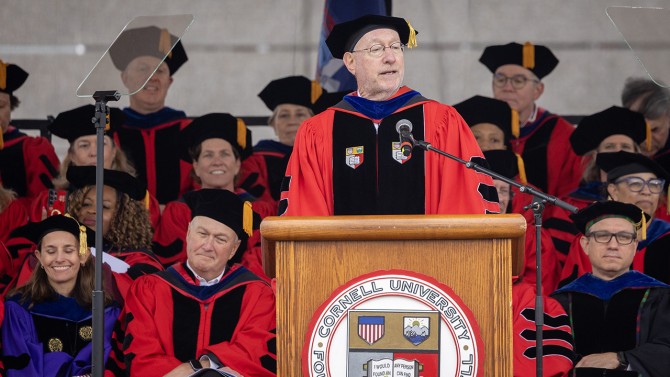
Cornell’s 157th graduating class, family and friends pack Schoellkopf Field as President Michael Kotlikoff gives his Commencement address.
Kotlikoff encourages grads to hold fast to community, values
By David Nutt, Cornell Chronicle
At a time when the U.S. seems bitterly divided, President Michael I. Kotlikoff offered graduates at Commencement, held May 24 at Schoellkopf Field, some historical perspective – and a reason to be proud.
“Democracies aren’t intended to be places where everyone always agrees,” he said. “But what they do require to succeed is a shared understanding about how we disagree – how to discuss differences, honestly and in good faith; with knowledge and facts, and with respect for those with whom you differ.”
“At Cornell, we’ve tried very hard to maintain a house united,” he added. “Stress can either pull a community apart or make it stronger. The ability to overcome difference, and to avoid division, lies in our ability to listen to each other and stay true to our values and our principles.”
Those values and principles were on vivid display – despite the damp, chilly weather – as Cornell’s 157th Graduating Class gathered together one last time, with their friends and family members watching beneath ponchos and umbrellas from the stands. Ceremonies took place at 10 a.m. and 2:30 p.m. Deans from the colleges and schools presented students for degree conferral. Each cohort of candidates received its own enthusiastic adjective, from “peerless” and “unstoppable,” to “visionary” and “trailblazing,” to “life changing” and “world building.”
Kotlikoff was introduced by Provost Kavita Bala, who congratulated the graduates on all they had accomplished to arrive at this day.
“You have grown intellectually and personally in a time of many uncertainties. The road has not always been easy, and your growth required hard work and sacrifice by you and by your loved ones. … You’ve learned not only from your faculty, but more importantly, also from each other. You head now out into a very fast-changing world,” Bala said. “On behalf of your faculty advisers, your mentors and all who have supported you on your journey here, I offer my best wishes for your future.”
Before the graduates turned their attention to the future, Kotlikoff took a moment to look back – way back – to the past, specifically April 1865, when Cornell was chartered. The Civil War had left the country more divided than it had ever been. Kotlikoff noted that division has frequently been a part of American society – by design.
The university’s founders Ezra Cornell and Andrew Dickson White strove to create an institution that welcomed “any person” to pursue “any study,” a place where students from different backgrounds could participate in a diverse “shared community” and gain a deepened understanding of others, Kotlikoff said.
Today, he said, the nation is confronting old differences that are being amplified in new ways.
“New technologies designed to bring us together instead are pulling us apart,” he said. “Each of us is invited, every day and in a thousand ways, into private worlds built only for us: where we hear only the opinions we agree with, see only the stories we want to read, and watch only news that an algorithm predicts we’ll click on and like.”
Kotlikoff, who began his remarks in the second ceremony by announcing that Cornell men’s lacrosse had just beaten Penn State, 11-9, and will play for the national championship on Monday, shared his wish that Cornell graduates embrace the complex world around them and avoid “the isolation that beckons from inside of your phones and your feeds.”
Kotlikoff recounted the challenges currently faced by Cornell and the country, from accusations of political bias to questions about the value of higher education, to criticisms that the university has allowed “too much expression, or too little, or the wrong kinds.”
Cornell’s commitment to diversity is what transformed it from “a tiny, struggling university to a powerhouse of academic excellence that became the model of the modern research university,” he said, which has attracted brilliant and curious generations, who have enriched the community and made it their own.
“When I first arrived here, back in 1999, one of those people on this campus was Hans Bethe,” Kotlikoff said. “In his decades at Cornell, Bethe was known, not only for being a theoretical physicist who had won the Nobel Prize, but for picking up students in his car as he rumbled up Buffalo Street; for hair that looked perpetually electrified; and for riding his bicycle around the Cornell Synchrotron, which runs thirty feet below the football field that you are sitting on right now.”
Bethe began his science career in Germany, but, because of his Jewish heritage, he fled for England when the Nazis rose to power in the 1930s. He was soon offered a job at Cornell and he lived in Ithaca until his death in 2005.
“Bethe talked in later years about the sense of relief and comfort he had when he joined this community. An ocean away from where he was born, in a community of people he’d never met, Bethe found the place where he belonged; where, for the rest of his life, he felt at home,” Kotlikoff said. “And in making Cornell his home, he also created an intellectual home for others, a community others wanted to join.”
Kotlikoff encouraged graduates to use what they have learned at the university wisely and well, to build and cherish new communities and, at the same time, to hold fast to the community, and the values, they found at Cornell.
“‘Any person, any study’ is the ethos and the greatness of Cornell,” Kotlikoff said. “But it is also, in deep and fundamental ways, the greatness of this nation.”
The full speech can be read here. A livestream of the first ceremony can be viewed here; the second ceremony can be viewed here.
Media Contact
Get Cornell news delivered right to your inbox.
Subscribe




